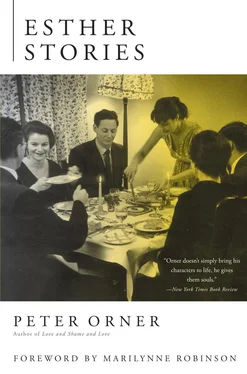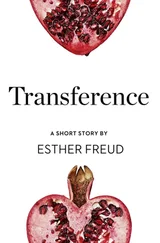When Mrs. Gold clattered into the room in heels, fur, and white leather, Don was gone and the fire had burned down to ashes.
“Honeybaby,” she said as I stared droopily at her tower of hair. “You’re getting beautiful. Since when all of a sudden are you getting beautiful?”
SHE’S WEARING a daisy-patterned yellow one-piece and an enormous blue hat and she’s rubbing sunscreen on her husband’s flubby back. He’s got a cigarette drooping out of the side of his mouth, and he’s so pale he looks like he spent the last thirty years in a basement. She slides her fingers under his waistband. He leaps and yelps, For crying out loud, woman, on the beach in front of all these people? She hands him the bottle. Now do me. He takes the bottle and squeezes a burble of lotion into his palm. Then he breaks an egg on her head, one hand cracks his lotioned fist, and he slithers both hands past her ears. She does not scream, just says quietly, I’ll kill you you fat bastard. He shakes the remaining contents of the bottle on his own head and musses his hair. Now both have shampoo-lather heads. She takes his hand and says, I should have married Bea Halprin’s brother, Aubrey, the dead one. Let’s swim, he says. He’d have croaked by now and I’d be living on State Farm. I said let’s swim, he says. They walk to the edge of the water and linger there. That wasn’t funny about poor Aubrey, he murmurs, as his wife, who is Sarah, dives and shrieks into the cold June Atlantic blue.
THE THRILL of murdering her mother’s plants. It comes back to her while pushing her baby daughter’s wicker carriage down Everett Street. Something about the wind and the shadows of the trees and the frightening radio reports makes her think of her father’s doom. She was twelve, and her father was smothered under piles of blankets on his deathbed, except that he wouldn’t die. And nothing could convince her that her mother hadn’t put him there. So she’d stomped across the house and yanked up all the plants by their roots, and run outside, tearing at her own hair as if it too were a plant. Her mother wondered to the doctor, who was in the house attending her father, if her daughter wasn’t possessed by something. “She’s always been an hysterical girl. It’s been known to happen in this town, you know.” And the doctor sipped his tea and laughed, but held off saying anything out loud about Lizzie Borden in a house so full of death already. Instead, he said, “The girl’s grieving, Frieda. Let her be.” But the idea made Sarah smile, too, standing in the long brown grass beneath the open kitchen window, listening. The idea of wielding that famous ax was not all that unappealing. Hadn’t Uncle Solly told her that when he was a boy he delivered newspapers to Lizzie herself’s door at Maplecroft, and that she always gave him dimes and pats on the head, even if she did do it? And everybody knows she did it, Uncle Solly said. So you could still be good after doing something like that. If she did it, she promised herself, she’d spare her baby brother.
“He isn’t dead yet, Azariah,” her mother answered the doctor.
And she remembers not hearing what the doctor said back, because she was already running, running down the cobbled streets, barefoot, stubbing her toes, hating her mother, and at the same time knowing how right she was — that no, he wasn’t dead yet, that he was going to linger in that bed with that goat, the maid, Lillian, sponging his head forever, and she’d never be free to blame her finally and absolutely for doing it to him, for all those years of haranguing that drove him upstairs to bed for good. Her father retreated, skulked away from living; he didn’t flee.
Now she looks at her own daughter, her Rhoda, bonneted, curled up, huddled in blankets, one foot sticking out over the edge of the carriage. One little leather shoe. Walt made such a game about shining her shoes with spit and polish. A daughter of mine’s gotta look her best gorgeous!
Again she sees herself sprinting across these bleak streets, into and out of muddy puddles. Her bleeding feet numb. There was a war on, just as there’s one brewing now, and she remembers thinking then she’d just as soon all the soldiers die, if her father had to die. Because, though she knew nothing of what men do after they fight wars, she could see them coming home already, alive, those marching men she had watched from atop her father’s shoulders, to flowers and songs. She could hear her mother praise them. And her father will still be upstairs, not dead but dead, and she’ll still be a girl who’s lost everything.
She remembers running and being happy she killed those plants and sorry the doctor didn’t agree with her mother, sorry he didn’t say, Yes, Frieda, maybe this girl is possessed by demons. Because she wanted Dr. Buffington to examine her the way he did her father. Wanted him to poke her and look under her eyelids. She wanted to be the one, not her father, to rub her sores and rub her sores and rub her sores. It should be her in that bed wrangling, kicking off the covers (he was always either too hot or too cold), wheezing like an exhausted horse, rubbing. The one with Lupuserythematosus. A word she practiced saying, over and over. Such a huge and ugly word for a laughing, big-eared man. She wanted to be the one upstairs in the bed while her mother, in the kitchen, moans that the noise is killing her: My husband dying of a woman’s disease.
Sarah wanted to be the one that stupid Lillian sponged and cooed.
A mother now, a wife now, but the streets will always be the same. Farragut. Gardner’s Neck. Weetamoe. Massasoit. Wampanoag. Running, toes bleeding. She could never get far enough away. The baby shakes the bonnet off in her sleep. Her father died. The soldiers came home. Her mother still won’t look at her baby.
Walt Kaplan Reads Hiroshima, March 1947
HE SITS in a creased maroon leather recliner with his feet flat on the rug. The book is slender, nearly weightless in his hands. The door of his tiny study is closed. He reads by the light of a lamp that sits on a dark oak desk, now cluttered with a few opened books, face down. Otherwise the desk is tidy, with a lone paperweight in the shape of a terrier (the same one he once tried to glue to the hood of his Ford in a dig at Cy Friedman and his Cadillac DeVille), a heavy-duty stapler, a leather-bordered blotter, and a small framed photograph of his daughter as a baby. His wife, Sarah, gabs in the back yard with Erma Friedman — he can see them from the room’s single window — the ladies stand, wavy dresses in the gust, by the huge boulder that looms oddly between the two houses. It is late afternoon, Saturday. He reads. By page 13 the flat nonchalant terrorless prose begins its scream. Everything flashed whiter than any white. He reads.
No one could say that Walt’s not a patriot. In the war he was 4-F. Wife and daughter plus extreme asthma. So he joined the Civil Defense. His job was to make sure people retreated to their houses, to their basements, when the air-raid sirens shrilled. Walt Kaplan, rooted in the middle of Weetamoe Street with his steel helmet loose on his head, ordering and pointing. A starter’s gun loaded with blanks jammed into the waistband of his pants, the idea being that if people didn’t move fast enough he could fire into the air. Once he’d threatened to do it when that loony Roland Shutan refused to stop mowing his lawn. Walt had raised the little gun above his head but hadn’t fired, and though the gun made him almost a soldier, he never liked the weight of it in his palm.
And though the 4-F made him a coward and he despised it with every ounce of his soul, he couldn’t picture himself firing on anybody, even Rollie Shutan, even with a gun that shot only blanks. A man with a wife and daughter killing anybody. But didn’t Melvin Zais have a wife and son, and didn’t he die in Italy, a married hero with a son to worship his photograph? Didn’t scrawny Mel Zais die with a gun in his hands? Mel Zais, who worked alongside him at J. J. Newbury’s and later at his father’s store, who lived at 618½ Tuttle Avenue his whole life, even after he married Irene and they had Toby, dying at Anzio with a gun in his hands, sweet Italian soil in his mouth and a single Fascist bullet in his temple. Now, in this thickened quiet of 1947, when he no longer is called to the street (he keeps the little gun in his drawer), he reads of Truman’s bomb, more than twenty thousand tons of TNT, atomic, and Father Wilhelm Kleinsorge in his underwear. He reaches the bottom of page 48.
Читать дальше












